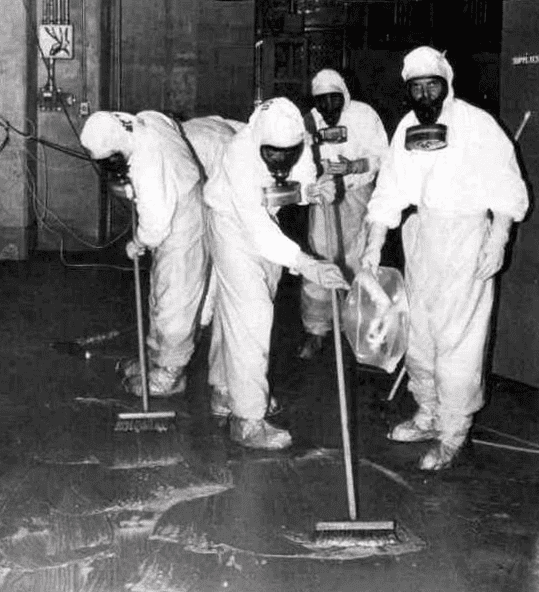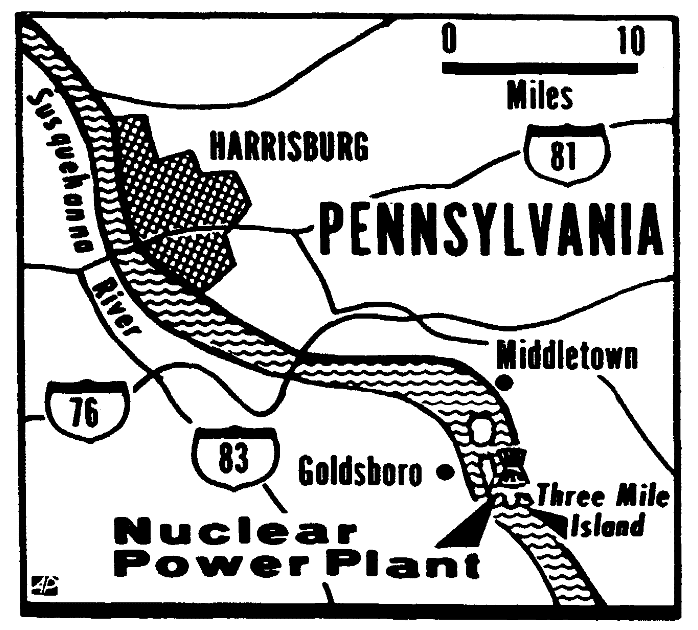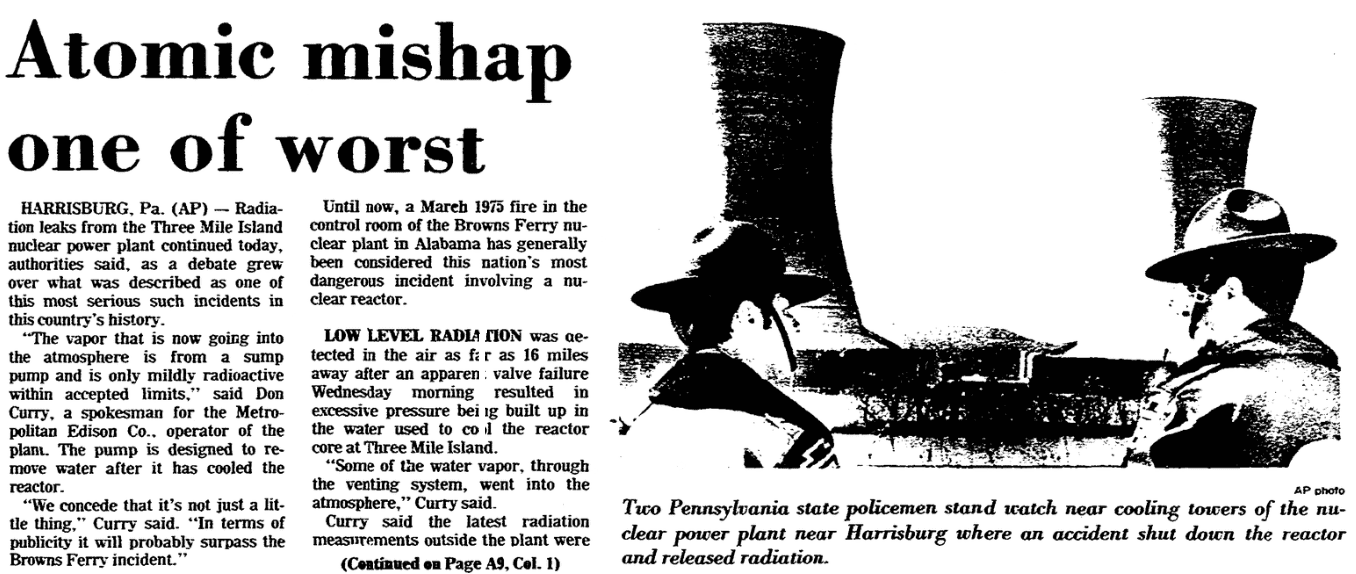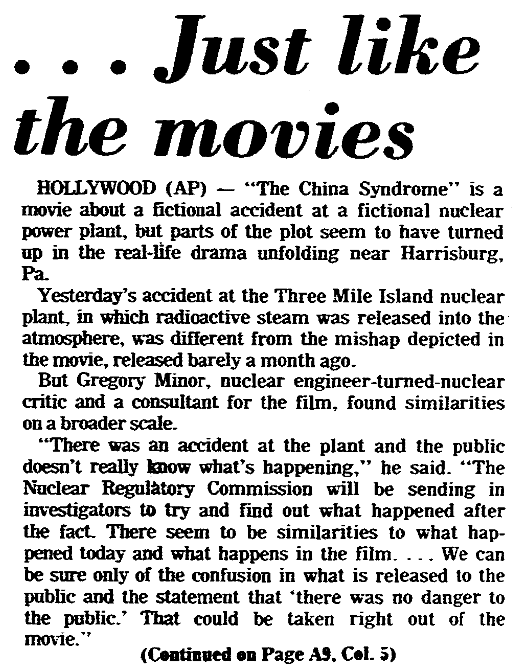On 16 March 1979, Hollywood released the blockbuster film The China Syndrome, depicting a frightening near-meltdown at a nuclear power plant. In an astonishing example of life imitating art, 12 days after the film’s debut a real-life nuclear accident occurred – one of the worst in the history of the industry – when the Three Mile Island nuclear power plant accident in Pennsylvania released radioactive steam into the atmosphere on 28 March 1979. It was publicity no Hollywood producer could ever dream up, but its environmental and public safety ramifications were real enough.

In a combination of equipment failure and operator error, vital coolant drained due to a stuck valve – and the core of one of Three Mile Island’s two nuclear reactors overheated and partially melted down. A significant amount of radioactive steam escaped and was detected up to 16 miles away, but the U.S. Nuclear Regulatory Commission maintains no one was hurt or killed by the accident, either inside the plant or in the surrounding community.

A series of follow-up health studies have been conflicting and controversial, some saying there were no detectable health hazards while others claiming there were increased rates of infant mortality, leukemia and lung cancer. Although there was no official evacuation order issued, Pennsylvania Governor Dick Thornburgh suggested that pregnant women and young children within five miles of the accident should consider evacuating; in fact, over 140,000 people left the area.

Here is a transcription of this article:
Atomic Mishap One of Worst
HARRISBURG, Pa. (AP) – Radiation leaks from the Three Mile Island nuclear power plant continued today, authorities said, as a debate grew over what was described as one of the most serious such incidents in this country’s history.
“The vapor that is now going into the atmosphere is from a sump pump and is only mildly radioactive within accepted limits,” said Don Curry, a spokesman for the Metropolitan Edison Co., operator of the plant. The pump is designed to remove water after it has cooled the reactor.
“We concede that it’s not just a little thing,” Curry said. “In terms of publicity it will probably surpass the Browns Ferry incident.”
Until now, a March 1975 fire in the control room of the Browns Ferry nuclear plant in Alabama has generally been considered this nation’s most dangerous incident involving a nuclear reactor.
Low level radiation was detected in the air as far as 16 miles away after an apparent valve failure Wednesday morning resulted in excessive pressure being built up in the water used to cool the reactor core at Three Mile Island.
“Some of the water vapor, through the venting system, went into the atmosphere,” Curry said.
Curry said the latest radiation measurements outside the plant were at two to three millirems. Individuals are exposed to up to 30 millirems in a single X-ray examination.
Walter Creitz, president of Metropolitan Edison, said on ABC-TV’s “Good Morning America” show this morning that the plant shut down safely and that the level of radiation released “would not endanger or injure any people.”
Creitz said his company did not know what equipment had been disabled or what precisely caused the accident.
“Anything that man makes will not operate perfectly,” he said. “A piece of equipment failed.”
Metropolitan Edison is a subsidiary of General Public Utilities, a New Jersey-based utility holding company.
The shutdown of the Three Mile Island Plant could cause a small increase in fuel bills to customers of another GPU subsidiary, Jersey Central Power & Light Co., which owns 25 per cent of the plant.
“If the nuclear plant is shut down and we have to make up with high-priced oil generation it would impact the customer through the energy adjustment charge,” Sam Laird, a spokesman for JCP&L, said today.
A spokesman for the National Weather Service in Philadelphia said there was no evidence that the winds were carrying any of the radiation out of the area of the accident.
Even if the winds were transporting the radiation it would be sent north of Harrisburg, not to New Jersey or Philadelphia, he said. In the meantime, Sen. Gary Hart, who chaired the Senate Public Works subcommittee on nuclear regulations, said today the plant had been shut down four times “for various kinds of malfunctions or failures to meet regulations” since it started operating in December.
The Colorado Democrat, in an interview on NBC’s “Today” show, said he was briefed last night by investigators from the Nuclear Regulatory Commission who told him human error may have contributed to the accident.
State officials said they had no plans to evacuate any of the 15,000 people living within a mile of the site, and workmen at the site and residents nearby seemed unperturbed.
“You get more radiation from standing out in the sun than we do inside the plant,” said one worker just back from a Wednesday shift.
Grim-faced crews of 70 men each wore hard hats and protective clothing as they worked around the clock to mop up radioactive water in an auxiliary building next to the reactor.
Note: In that same March 29 issue, the Trenton Times published a related article making the connection between the Three Mile Island accident and the recently-released movie The China Syndrome.

Here is a transcription of this article:
…Just Like the Movies
HOLLYWOOD (AP) – “The China Syndrome” is a movie about a fictional accident at a fictional nuclear power plant, but parts of the plot seem to have turned up in the real-life drama unfolding near Harrisburg, Pa.
Yesterday’s accident at the Three Mile Island nuclear plant, in which radioactive steam was released into the atmosphere, was different from the mishap depicted in the movie, released barely a month ago.
But Gregory Minor, nuclear engineer-turned-nuclear critic and a consultant for the film, found similarities on a broader scale.
“There was an accident at the plant and the public doesn’t really know what’s happening,” he said. “The Nuclear Regulatory Commission will be sending in investigators to try and find out what happened after the fact. There seem to be similarities to what happened today and what happens in the film…We can be sure only of the confusion in what is released to the public and the statement that ‘there was no danger to the public.’ That could be taken right out of the movie.”
Actor Michael Douglas, who produced and co-starred in “The China Syndrome,” said he found the real accident “disturbingly ironic.”
Jane Fonda, partner with Douglas in preparing the movie, was on a film location in Utah and unavailable for comment. Her partner and executive producer of “The China Syndrome,” Bruce Gilbert, said, “There is a great temptation to say ‘I told you so.’ But we’re as shocked as anyone about what has happened.”
The movie begins with a mishap at the fictional Southern California nuclear plant. The film’s accident starts a chain of events that is stopped just short of disaster.
Minor said that on the basis of sketchy preliminary reports, the real accident involved different equipment and developed quite differently than the fictional incident.
The nuclear industry has attacked the movie as anti-nuclear propaganda, while opponents of atomic energy have rallied to its support.
Amid the controversy and publicity, “The China Syndrome” has become Columbia Pictures’ biggest moneymaker released in a non-holiday period. Its gross for the first 10 days is reported at $10,932,964.
Douglas, who made extensive appearances with co-stars Jack Lemmon and Jane Fonda to promote “The China Syndrome,” said, “All we tried to do was promote the movie as a thriller. We didn’t ask for the controversy.
“We went through a lot of struggle to make the film as honest as possible. Except for the finale, all of the incidents have happened.”
Douglas and Minor said the potential accident in the script was a composite of a 1970 incident at Commonwealth Edison’s Dresden No. 2 plant in Chicago and a 1975 fire at the Browns Ferry reactor in Alabama.
Note: An online collection of newspapers, such as GenealogyBank’s Historical Newspaper Archives, is not only a great way to learn about the lives of your ancestors – the old newspaper articles also help you understand American history and the times your ancestors lived in, and the news they talked about and read in their local papers. The same is true of more recent events.
